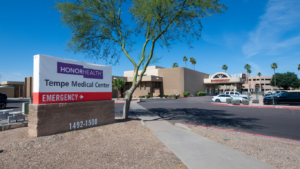At 11:01 p.m. on Thursday May 4, 2017, the Arizona Senate passed HB 2547: university infrastructure capital financing; appropriations paving the way for up to $1 billion in bonds to expand and maintain university research infrastructure at Arizona’s public universities.
HB2547 is part of a set of budget bills that make up Arizona’s $9.8 Billion Budget for the fiscal year the begins on July 1, 2017. The bill’s primary sponsor was Representative Paul Boyer (LD-20). Representative Boyer is the Chairman of the House Education Committee and is a member of the House Health and County and Municipal Affairs Committees.
A vehicle supporting the $1 Billion investment in Arizona’s University Research Infrastructure was originally proposed in Arizona Governor Doug Ducey’s Executive Budget on January 13, 2017. The Governor’s Plan proposed allowing Arizona’s three state universities to apply the Transaction Privilege Tax (TPT) revenue that they create to support up to $1 billion in bonding for research and development and deferred maintenance construction projects.
While support for investing in Arizona’s future by expanding our university research infrastructure was strong in the community and with members of the legislature, concerns over the use of TPT revenue and the impact that it could have on other stakeholders was a legislative concern. Achieving the goal of an $1 Billion investment would require creativity, collaboration and compromise.
Reaching the Destination with a Different Vehicle
Following months of committee hearings, discussions, stakeholder meetings, and communication with constituents, a new funding plan was developed that combines a percentage of the new licensure and royalty agreements that are the result of research at Arizona’s public universities with State funding support and a university match to allow for up to $1 Billion in bonding capacity for Arizona’s public universities . This plan became HB2547 which first passed in the Arizona House of Representatives (33-26) followed by the Arizona Senate (23-7) paves the way for a $1 billion investment in Arizona’s public universities and is on the way to the Governor’s desk.
Among other things, HB 2547:
- Provides authority for up to $1 Billion in bonding for new university infrastructure projects with financial support from the State of Arizona beginning in the 2019 budget year.
- Establishes a University Capital Infrastructure Fund with subsets for each university and prescribes a formula to calculate amounts appropriated to each university Fund for FY 2020 through FY 2043.
- Specifies certain amounts each university that has a licensure or royalty agreement or agreement for the sale or transfer of intellectual property developed by a university entered into beginning May 1, 2017 must deposit into the Arizona General Fund with a cap not to exceed amounts appropriated regarding lease-purchase capital financing and infrastructure capital financing.
- The Monies, in accordance with the approved schedule, are continuously appropriated and exempt from lapsing through 2043.
- Requires each respective university to appropriate a matching amount equal to the amount of General Fund monies used for paying debt service on debt financing for the capital projects.
- Allows the Arizona Board of Regents (ABOR) to enter into, make payments, or any debt financing paid with Fund monies on behalf of a university related to the university’s Fund.
To view the full summary of HB 2547, visit http://www.azleg.gov/legtext/53leg/1R/summary/H.HB2547_05-04-17_HOUSEENGROSSED.DOCX.htm
Building on Past Success
In 2003, the Arizona Legislature authorized an annual appropriation of $35 million to construct roughly $500 million worth of university research facilities that was championed by then-Speaker Pro Tempore Bob Robson.
These projects included the Biodesign Institute at Arizona State University, The University of Arizona’s Keating Bioresearch Building which houses the UA BIO5 Institute, and Arizona Biomedical Collaborative 1 on the Phoenix Biomedical Campus. At Northern Arizona University, the Applied Research and Development facility has enabled the university to expand its research in the areas of national defense and infectious disease.
Since the state’s investment in 2003, research activity conducted at Arizona’s public universities has increased 77 percent and now totals nearly $1.1 billion each year. University invention disclosures have increased 154 percent. Degrees awarded in high-demand fields, including key STEM (Science, Technology, Engineering and Math) fields, have increased 40 percent in the past six years alone.
In fiscal 2015, Arizona’s three public universities were responsible for an estimated 102,000 jobs and $11 billion in total economic impact.
“Our investments in university research infrastructure have been and will be a major economic driver,” shared Joan Koerber-Walker, president & CEO of the Arizona Bioindustry Association (AZBio). “Yet, measuring this impact in a purely economic sense overlooks the greater value that life science research represents. The greatest value comes from the life-saving and life-changing innovations that will make life better for people in Arizona and around the world. Arizona university researchers and their industry partners are discovering, developing, and delivering products and services that will help people stay healthy, aide them when they are ill, and improve their quality of life. By doubling down on our earlier research infrastructure investments, Arizona’s leaders are paving the way to a brighter future for the people of Arizona. We are truly grateful to Governor Doug Ducey and the Arizona Legislature for their vision and their commitment to invest in Arizona’s future.”
“Arizona has passed a budget that prioritizes education, boosts teacher pay, and invests in our universities — all without raising taxes on hardworking Arizonans,” said Governor Ducey. “For the first time in a decade, we are making significant and lasting investments to grow our state — in state parks; in public schools and universities, in our roads and highways; and in programs to combat drug addiction, provide second chances to inmates, and place foster children in permanent homes. This would not be possible without the hard work to balance our budget over recent years. And it should come as no surprise that we are investing where it can really make a difference. I thank the legislature for their hard work and look forward to building on these gains to continue expanding opportunity for all Arizonans.”




